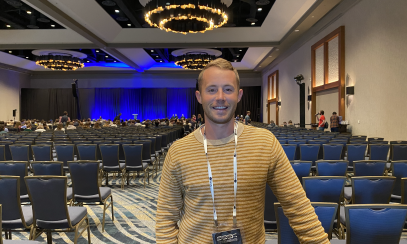
Surprise Hit ‘Lourdes’ Documentary, Coming to U.S. Theaters
February 7, 2023 | The French documentary film “Lourdes” will be shown in 700 theaters in the U.S., including theaters in the Tampa Bay Area, for a special two-day screening, on Feb. 8 (in French with English subtitles) and Feb. 9 (in Spanish with English subtitles).
February 7, 2023 | The French documentary film “Lourdes” will be shown in 700 theaters in the U.S., including theaters in the Tampa Bay Area, for a special two-day screening, on Feb. 8 (in French with English subtitles) and Feb. 9 (in Spanish with English subtitles).
The film presents a unique and moving view of the Catholic pilgrimage site as seen through the eyes of several pilgrims and their caregivers.
A surprise hit in France among critics and audiences, the award-winning documentary follows several sick and disabled pilgrims who travel to Lourdes in search of consolation, if not miracles, at the Marian shrine in the French Pyrenees. It was there on Feb. 11, 1858, that 14-year-old Bernadette Soubirous witnessed the first of 18 apparitions of the Virgin Mary.
The filmmakers received unprecedented access to the sacred site from the Catholic Church. The sick and disabled pilgrims are seen praying at the Sanctuary of Our Lady of Lourdes, worshipping at the grotto where the visions took place, being immersed in the baths, and perhaps most affectingly, being cared for and assisted by volunteers or “hospitaliers.”
The U.S. tour follows the film’s debut in France, where in 2020 it was nominated for best documentary at the Cesar Awards. Tickets for the Feb. 8 and 9 showings can be purchased online at Fathom Events or at participating theater box offices.
As many as 6 million people visit Lourdes each year to pray and to touch, bathe in and drink from the spring water that flows under the grotto where the apparitions of the Virgin first took place. More than 7,000 cures have been attributed to the intercession of Our Lady of Lourdes, with 70 officially recognized by the Catholic Church. A 15-minute-long “bonus” film following the presentation of the movie, distributed by Spain’s Bosco Films, features a Catholic physician discussing the miraculous cures attributed to Lourdes.
The movie “Lourdes,” however, is not exactly a movie about miracles. Audiences eager to be blown away by visible proof of the existence of a loving God who answers prayers may at first be disappointed when they realize it is not that kind of movie. What follows are miracles of a different sort: the gift of faith that makes possible peace and even joy through suffering, and the exercise of loving one’s neighbor in charity and compassion.
“Lourdes” is not always easy to watch — not only because it’s uncomfortable to see suffering at such close range, but also because the unfamiliarity with that feeling is an indication that one tends to go through life avoiding being exposed to it.
A despondent teenage girl has come on an annual pilgrimage with her unemployed father to bathe in Lourdes’ spring water. Her father hopes to cure her of the cysts forming in her arm, but she prays before the statue of the Virgin Mary for relief from the kids who bully her at school.
A mother and father travel by bus with their 40-year-old son who can’t stand or feed himself, as his mother confesses that she still blames herself for the accident that changed their lives forever.
A father and his son, who himself is sick, seek healing for a terminally ill younger brother suffering from a painful skin condition. The faith of the two is palpable as is that of the boys’ mother, who manages to radiate joy as she sees them off.
A man afflicted in the last stages of ALS explains that he is grateful for the gift of peace he feels he has been given.
A group of prostitutes from Paris makes a solemn annual “Magdalena” pilgrimage to Lourdes in the company of a Catholic priest who gently counsels one to consider giving up his way of life.
Another man communicates by pointing to letters on a sheet of paper. The wry, intelligent look on his face seems to invite people to engage in conversation with him. We later learn that he has attempted suicide twice.
The inspiration for the movie came from its writer, veteran journalist Sixtine Léon-Dufour, who first went to Lourdes as a volunteer, very reluctantly, on the occasion of her mother-in-law’s 70th birthday. Once there, she was profoundly moved by the work of bathing, dressing, feeding, and talking to the pilgrims, and now returns with her family every year.
When she is volunteering at Lourdes, she told CNA that she is struck by the faith of the pilgrims, who, she said, come for consolation more than for a cure.
“What they all say is that when you go to the grotto and you spend some time praying — or not — at the feet of this statue of the Virgin Mary, you find peace, a real peace,” she said.
While Léon-Dufour is Catholic, the film’s directors, Thierry Demaizière and Alban Teurlai, are nonbelievers, she said.
In the months they spent interviewing people to feature in the movie, she said, the directors would always ask the same question: “You’re very Catholic, you pray a lot. Tell me, you are absolutely looking for a miracle, right?”
“And each time all the people you saw in the documentary, they said, ‘No, no!”
“No matter how hard I tried to explain that people come to Lourdes not especially looking for a miracle they would not understand that it was much more about faith and being together to find some comfort,” she said.
And despite the directors’ initial confusion and purported lack of faith, they managed to capture traces of the divine in the interactions between the sick and the volunteers who assist them. The word “miracle” comes from the Latin miraculum or “thing of wonder,” which perfectly describes these encounters.
The film shows the sick and disabled pilgrims light up when they are with others who treat them with love and respect. Volunteer nurses are seen engaging with their charges, talking to them, and drawing them out. For some pilgrims, it is clear that just being touched or held as they are bathed and dressed delights them.
For other sick pilgrims, it is the conversation that brings them joy. A sad-looking woman in her 90s appears completely transformed after talking with a young volunteer who engages with her as she would a friend. At first quiet and guarded, the encounter leaves the woman smiling, telling stories, and even singing.
For tickets and to see a list of showtimes near you visit: lourdesthemovement.com



